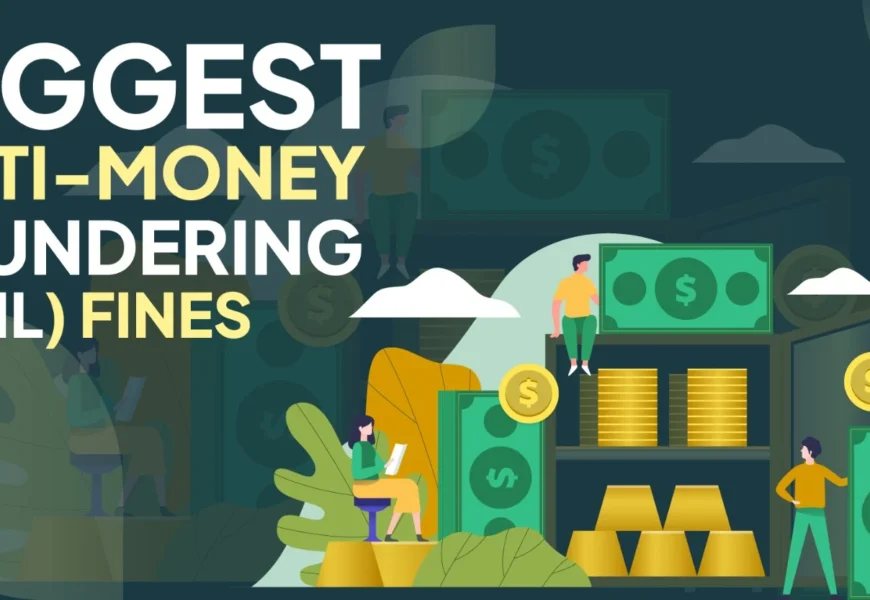Imagine waking up and realizing your company owes $8.9 billion.
Not because of a bad investment. Not because of a market crash. But because regulators slammed you with one of the largest fines in history—for failing to stop money laundering.
That’s the reality some of the world’s biggest banks have faced. HSBC, Danske Bank, BNP Paribas—giants brought to their knees, not by competition, but by compliance failures.
The numbers are shocking, the headlines unforgettable. But behind every fine is a lesson—and for startups and fintech’s, those lessons can mean the difference between building trust or breaking it.
Let’s break down some of the biggest AML fines in history and what we can learn from them.
HSBC – $1.9 Billion Fine (2012)
The bank that cartels loved.
HSBC was fined after U.S. authorities discovered it had allowed Mexican and Colombian drug cartels to launder billions through its accounts. Outdated monitoring systems and ignored red flags were at the heart of the scandal.
Lesson: Even global banks can’t afford to treat AML as a side project. If monitoring systems don’t work—or worse, are ignored—the fallout can be catastrophic.
Danske Bank – $2 Billion+ Fine (2022)
The $230 billion pipeline.
Danske Bank’s Estonian branch became the epicentre of one of the largest money laundering scandals ever, with an estimated $230 billion in suspicious transactions flowing through.
Lesson: Local branches and subsidiaries are just as important as headquarters. A global presence means global responsibility—and regulators expect oversight everywhere.
BNP Paribas – $8.9 Billion Fine (2014)
The sanction breaker.
BNP Paribas, one of Europe’s largest banks, was fined nearly $9 billion for violating U.S. sanctions by processing transactions for Sudan, Iran, and Cuba.
Lesson: Sanctions screening is non-negotiable. One oversight in dealing with blacklisted countries can lead to record-breaking penalties.
Wachovia (Now Wells Fargo) – $160 Million Fine (2010)
The cartel’s cash machine.
Wachovia allowed Mexican drug cartels to launder nearly $378 billion through its U.S. operations. The bank failed to monitor bulk cash transactions, enabling criminal networks to thrive.
Lesson: AML isn’t just about compliance—it’s about real-world harm. Weak controls can literally fuel crime, and regulators treat that very seriously.

Standard Chartered – $1.1 Billion Fine (2019)
The repeat offender.
Standard Chartered was penalized for AML failures and breaching U.S. sanctions. What stung most? Regulators had already warned them years earlier, yet issues persisted.
Lesson: Compliance is never “done.” Regulators are especially harsh on repeat failures—ignoring warnings can multiply penalties.
Key Takeaways for Startups &FinTech’s
You might be thinking: “These are giant banks—what does this have to do with my startup?”
The truth? Regulators don’t just chase big names—they go after anyone who drops the ball. And beyond fines, investors and customers expect trust and accountability from day one.
Here’s what you can learn:
Strong monitoring is non-negotiable – even at a small scale, set up systems to track unusual activity.
Sanctions screening matters – one missed hit can snowball into massive penalties.
Culture counts – if leadership downplays compliance, it trickles down to weak practices.
Never ignore red flags – regulators punish “wilful blindness” more than honest mistakes.
Start early – fixing AML gaps later is far more expensive than building them right from the start.
Looking Ahead
The billion-dollar fines make headlines, but the real cost is in trust. HSBC, Danske Bank, BNP Paribas—they’re still repairing reputations years later. And in finance, reputation is everything.
For startups and fintech’s, the lesson is clear: you don’t need billions at stake to risk it all. One compliance misstep can freeze accounts, scare off investors, or shut down partnerships overnight.
But here’s the good news: getting AML right early isn’t just protection—it’s a growth advantage.
Investors feel confident backing you.
Regulators see you as proactive, not reactive.
Customers choose you because they feel safe with you.
In a world where trust moves faster than capital, AML is more than compliance—it’s your credibility engine.
And the companies that thrive? They aren’t the ones cutting corners.
They’re the ones building trust from day one—and carrying it into the future.








